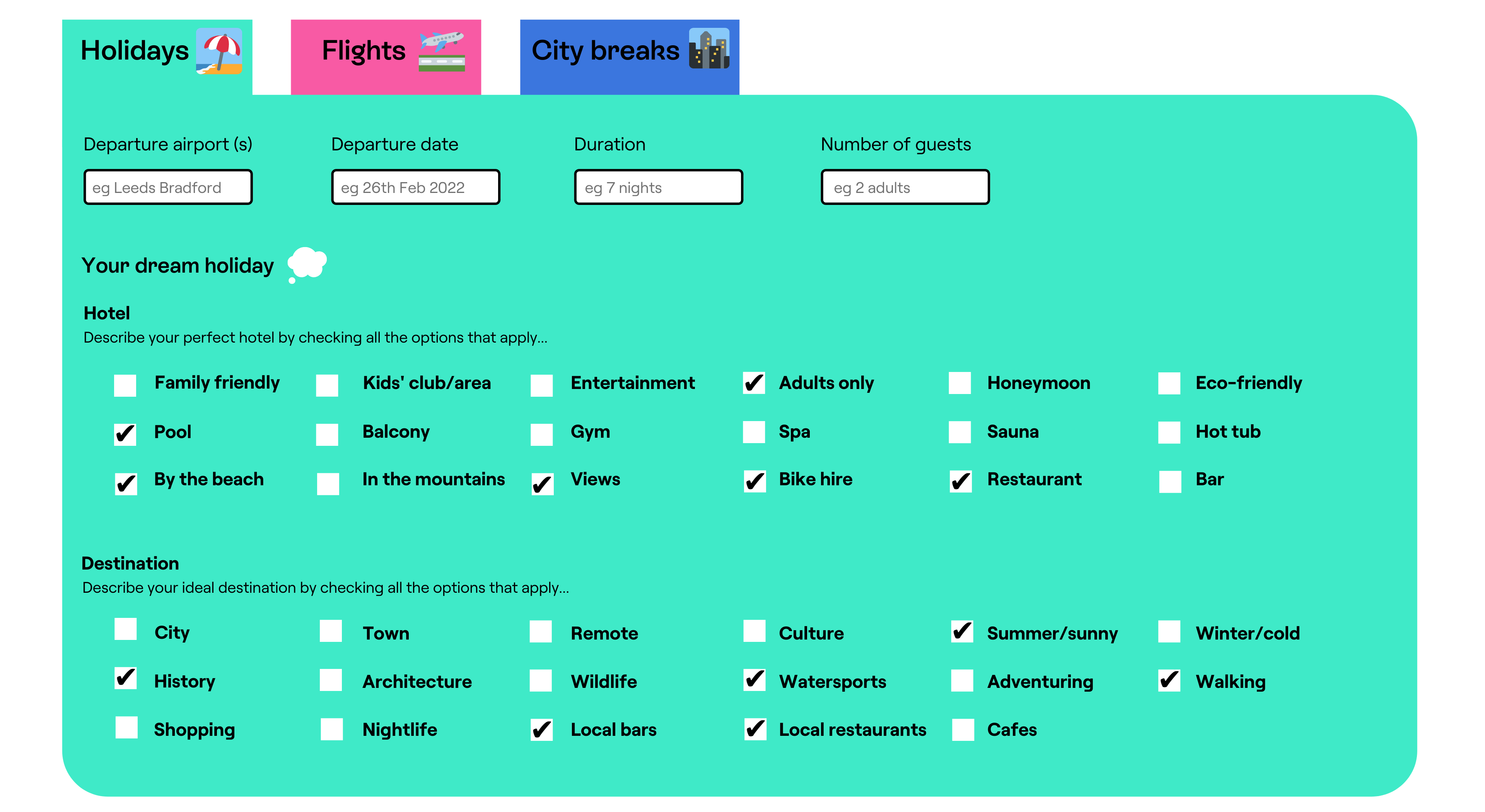
We explain how decision intelligence can help the travel sector power intelligent holiday search.
Picture this. Your ideal customer visits your website. They’re looking to escape the UK and book a seven-night holiday, but they haven’t settled on a destination.
They do know they want a four-star hotel. Warm weather. A pool. Close proximity to the beach. Historical locations to visit nearby. Bike hire. Oh, and plenty of local restaurants and nightlife…
Sounds good, doesn’t it?
Sadly, while you were reading that list, your ideal customer has bounced from your website. It’s not possible to search for holidays using a list of desirable destination amenities so, frustrated, they’ve moved on.
According to research by Think with Google, one in three travellers don’t have a specific destination in mind during the early stages of holiday planning. So just how many customers are you losing without intelligent search on your site?
Is there a simple solution?
Every day your website collects swathes of data based on consumer behaviour – from popular destinations and dates, to holidays browsed in the same session and abandoned purchases.
This data can be put to work with decision intelligence: a new tech category combining data science and AI to improve commercial decision making.
Decision intelligence powers better, faster decisions, unified around customers. It’s the simple solution for enhancing customers’ experience of searching for holiday and flight packages on your website.
How can decision intelligence hypercharge the travel sector?
Using the example in the opening paragraph, ‘four-star hotel’, ‘sunny’, ‘pool’, ‘beach’, ‘historical area’, ‘bike hire’, ‘local restaurants’ and ‘nightlife’ can be treated as ‘attributes’. Put together, these attributes become a ‘customer need state’ if consumers are looking for holiday packages to meet these exact requirements.
Attributes are ways in which customers think and talk about holidays, customer need states are how customers go about making buying decisions.
Currently, most airlines, leisure travel companies and tour operators only allow consumers to search for flights and holidays with ‘from’ and ‘to’ destinations and some basic filters. We see an opportunity to use attributes to power search – for example, the customer chooses from a list of attributes instead of selecting a specific destination.

Attributes based on customer need states.
According to ABTA, today’s post-pandemic world is prompting consumers to opt for package holidays – for both peace of mind and financial protection.
Decision intelligence can help airlines, leisure tour companies and travel operators provide intelligent search using holiday attributes and customer need states.
Once travel companies understand customer need states, they can begin to treat consumers dynamically. Similarly, affinity analytics (a data science and AI technique) can be used to link holiday attributes, as well as multiple hotels browsed within the same session.
Clustering holidays.
Decision intelligence uses customer, product and website browsing data to define clusters of holiday attributes that serve a distinct customer need.
Take adult only hotels with a spa, in close proximity to a historical centre, for both R&R and local exploration, for example. Hotels serving this specific customer need can be treated as a cluster. This knowledge helps you market several similar holidays to customers, giving them a curated choice. It also helps with pricing, catering for different budgets and balancing demand with supply.
Personalised recommendations.
Shopping for holiday packages isn’t an impulse buy. However, eCommerce research generally shows that personalising the customer journey drives higher conversion rates.
Manually selecting holiday recommendations takes time – and often isn’t backed by analytics. Instead, decision intelligence uses customer behaviour data to make personalised recommendations. It can also be useful for upselling – for example, by recommending upgraded holidays based on customers’ need states.
Customers love nothing more than finding a hidden gem that precisely meets their needs. Providing personalised recommendations, based on a deep knowledge of customer preferences, can help create these moments of serendipity.

Holiday range decisions.
Decision intelligence can also inform the range of holidays, flights and auxiliary products and services to offer. Using insights from customer and product affinities, detailed product attributes and customer need states, travel operators can determine what their customers desire the most, and what is of little interest.
For example, should you offer 10 different 5-star hotels in beach front locations in Majorca? Or actually, do you need greater choice? And what facilities are most in demand at those hotels?
These types of insights help make intelligence decisions on the product range to offer, boosting customer conversion, loyalty and your own commercial performance.
Intelligent pricing.
Effective pricing is a major lever of profitability for travel operators. Travel is one of the few industries in which dynamic pricing, based on supply and demand, are expected by customers. Getting pricing right is therefore one of the most critical commercial decisions you can make.
Traditional approaches to pricing don’t take into account how customers are actually making decisions. No decision is made in isolation, meaning changing different elements of your offering directly impacts the actions customers take. For example, adding a new flight or hotel or increasing marketing spend.
Data science and AI techniques, such as affinity analytics, can help airlines identify holidays with high affinity (i.e. similar packages) and assess demand transference/cannibalisation if prices are raised or lowered.
Using decision intelligence helps travel operators make intelligent pricing decisions which combine the need to convert customers with the desire to maximise profit margins.
Decision intelligence increases profitability and customer experience.
Air travel dropped by a staggering 71% in 2021. But you don’t need us to tell you how much the pandemic has affected your industry.
Decision intelligence presents airlines, leisure travel companies and tour operators with the opportunity to provide better user experiences to increase conversions and boost customer loyalty.
Remember the customer in the opening paragraphs of this blog?
With more intelligent commercial decisions about search, pricing, range and personalisation, this customer would have had a better experience.
Great experiences mean happier, more loyal customers and ultimately increases in revenue and profit.
Contact us to discover how decision intelligence can power intelligent holiday search for your travel business.



